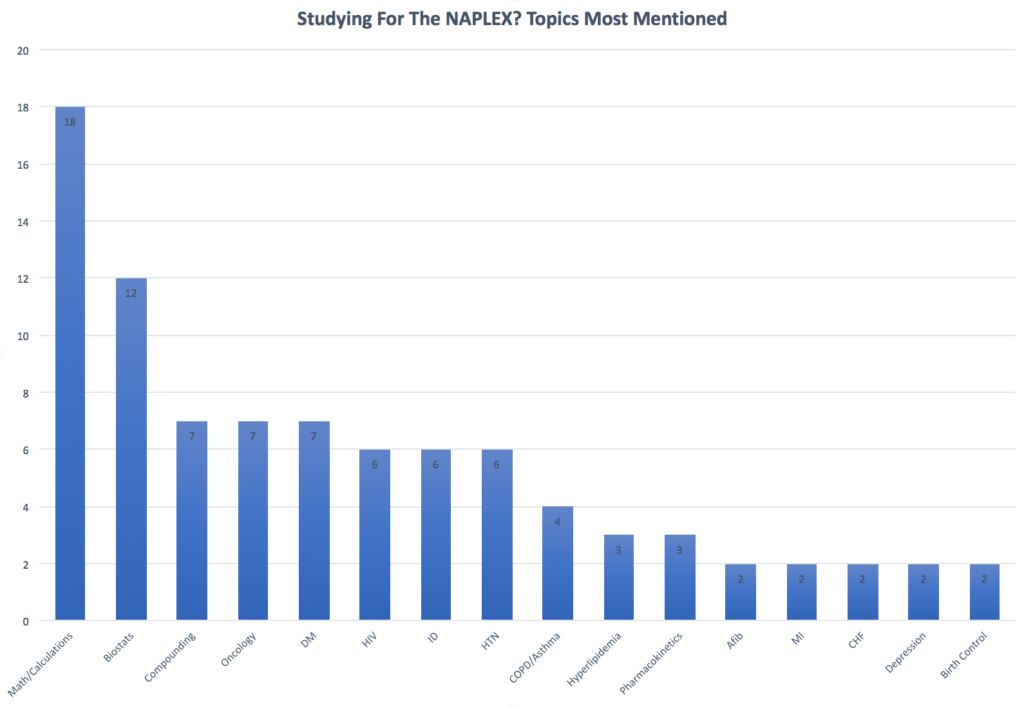There’s a ton of information and advice out there on the NAPLEX. A simple Google search will get you a variety of comments, mentions, blog posts, and other information on studying for the NAPLEX. I wonder what it would be like if anyone actually reviewed some of this data? The pharmacist and researcher in me could not resist putting something together. So here’s what the data says with regards to studying for the NAPLEX. For reference, you can find a link to the NAPLEX content outline here.
Background and Methods: NAPLEX Research
I reviewed a lot of information on this topic. I randomly tabulated over 107 mentions, blog posts, rants, social media posts, forum posts (I.e. SDN), and other sources that were readily searchable. These posts were from the previous two years, so the content is relevant to recent changes in the NAPLEX test format. I looked for people emphasizing topics that a student should be prepared for or that a pharmacy student was not adequately prepared for when they took their NAPLEX. Why 107? It was enough to prove my point. I do apologize as some of the words got a little small, but I wanted to include as much data as possible. Without further ado, here’s the topics that were most frequently mentioned.
Results: Which NAPLEX Topics Are Mentioned the Most?

The Others
There were other topics that were mentioned. They were only mentioned one time in the posts I reviewed. Topics mentioned once were; ADHD, anxiety, Cystic Fibrosis, insomnia, drug references, transplant, gout, bipolar, Parkinson’s, renal, Alzheimer’s, hepatitis, osteoporosis, rheumatoid arthritis, MS, and vaccines.
Discussion: Studying for the NAPLEX?
Now, I do want to caution you. If these folks discussing topics on the NAPLEX are anything like me, they remember topics that had a ton of questions and/or topics that they were not prepared for. So when you are studying for the NAPLEX, remember that because some topics did not show up in high frequency, does not mean you should ignore them.
I will also admit, it is tough to categorize things. For instance, cardiovascular as a more generic topic would rate very high if you included CHF, MI, Afib, hypertension, and hyperlipidemia. I went with what was actually mentioned in the posts as I figured more specific data was better than less specific data. I did combine COPD/Asthma as the medications in these disease states tend to overlap. People also mentioned these together.
I do think many pharmacy students are adequately prepared for chronic disease management topics like diabetes, hypertension, and hyperlipidemia. After all, you are most likely to see these topics on rotations regardless of what rotations you select. Disease states like oncology and HIV/AIDS are disease states that typically don’t have as many rotations available. These topics always seem to be more specialized and therefore, challenging. Even as a veteran pharmacist, I can attest to this.
Surprises? I was a little surprised by statistics. I was also a little surprised there wasn’t more mention of psychiatry topics. There are a lot of drugs within these topics. If you put all psych topics under one umbrella in the data, it would be a decent amount however. Pain management was also noticeably absent.
Conclusion
In studying for the NAPLEX, I would strongly urge you to assess your weaknesses and strengths. If you had 3 rotations on cardiovascular conditions, I wouldn’t spend a lot of time reviewing these topics. I would actually use the above data and start my study preparation with the most frequently mentioned topics. I would NOT use the above data and study ONLY those topics. That’s a BAD idea for your NAPLEX exam and for real life.
NAPLEX Study Materials
If you are wanting a review course and practice exam type package, you can see if our NAPLEX All Access package is a fit for you. We have 6 months and
Our latest resource for the 2019 exam (and beyond) is a 300+ page book full of critical notes in bullet point format. One of the major reasons I created NAPLEX Nuggets – The Cliffnotes was to ensure that you take a broad overview when preparing for the exam. This resource can definitely serve as a guide to help identify strengths and weaknesses. It is also a perfect resource to use in the weeks just prior to your exam as you are putting your finishing touches on your studying.
Hopefully this data helps get you started in your preparations for the NAPLEX. What jumped out at you as surprising? Or does the data match up with what you are expecting?
Eric Christianson, PharmD, BCPS, BCGP



0 Comments
Trackbacks/Pingbacks